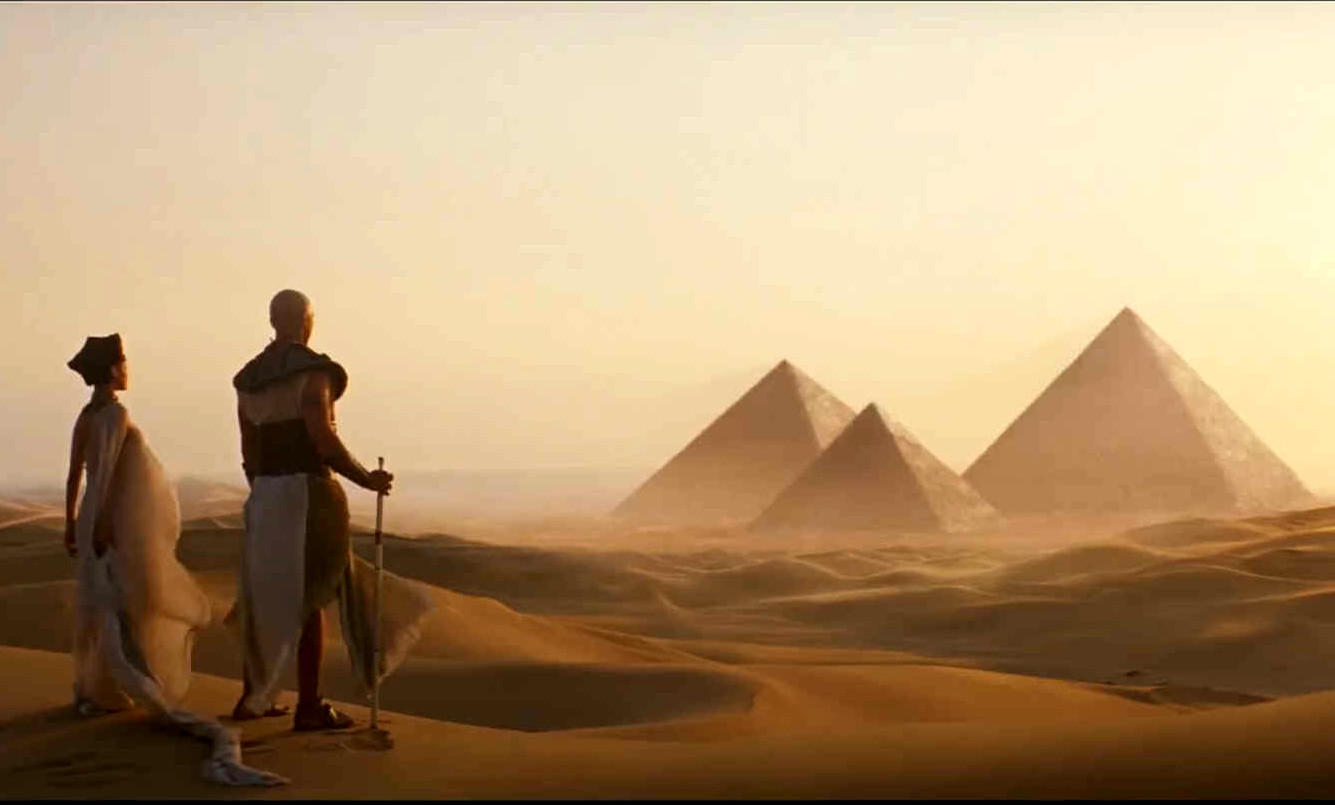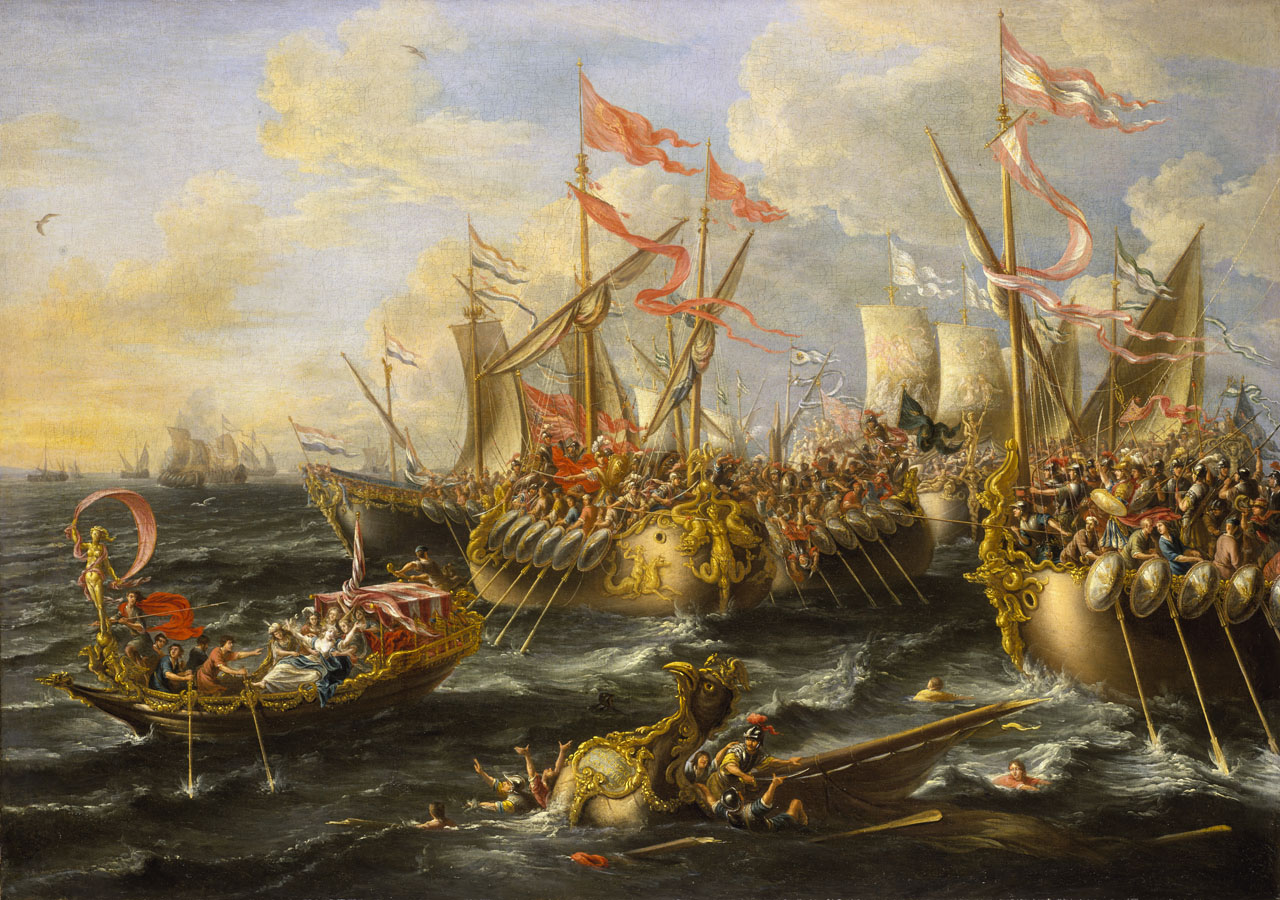
The
Battle of Actium, Ionian Sea
The Battle of Actium was a naval battle fought between a maritime fleet led by Octavian and the combined fleets of both Mark Antony and
Cleopatra VII
Philopator. The battle took place on 2 September 31 BC in the
Ionian
Sea, near the former Roman colony of Actium, Greece, and was the climax of over a decade of rivalry between Octavian and Antony.
In early 31 BC, the year of the battle, Antony and Cleopatra were temporarily stationed in Greece.
Mark Antony possessed 500 ships and 70,000 infantry, and made his camp at Actium, and
Octavian, with 400 ships and 80,000 infantry, arrived from the north and occupied Patrae and Corinth, where he managed to cut Antonyís southward communications with Egypt (via the Peloponnese) with help from
Marcus
Agrippa. Octavian previously gained a preliminary victory in Greece, where his navy successfully ferried troops across the
Adriatic Sea under the command of Marcus Agrippa. Octavian landed on mainland Greece, opposite of the island of Corcyra (modern Corfu) and proceeded south, on land.
Trapped on both land and sea, portions of Antony's army deserted and fled to Octavian's side (daily), and Octavian's forces became comfortable enough to make preparations for battle. Antony's fleet sailed through the bay of Actium on the western coast of Greece, in a desperate attempt to break free of the naval blockade. It was there that Antony's fleet faced the much larger fleet of smaller, more manoeuvrable ships under commanders Gaius Sosius and Agrippa. Antony and his remaining forces were spared only due to a last-ditch effort by Cleopatra's fleet that had been waiting nearby. Octavian pursued them and defeated their forces in Alexandria on 1 August 30 BC
- after which Antony and Cleopatra committed suicide.
Octavian's victory enabled him to consolidate his power over Rome and its dominions. He adopted the title of Princeps ("first citizen"), and in 27 BC was awarded the title of
Augustus ("revered") by the Roman Senate. This became the name by which he was known in later times. As Augustus, he retained the trappings of a restored Republican leader, but historians generally view his consolidation of power and the adoption of these honorifics as the end of the Roman Republic and the beginning of the Roman Empire.
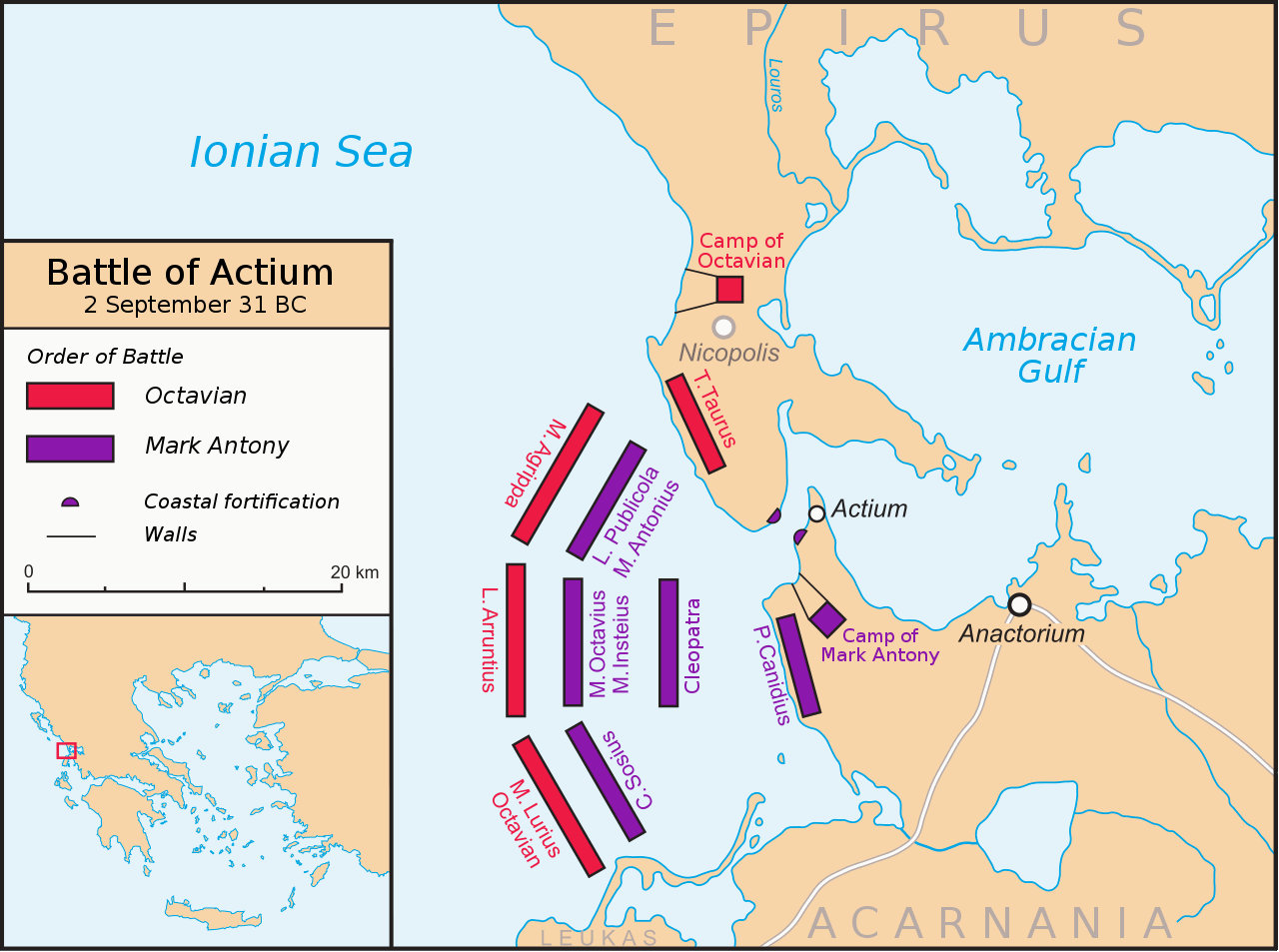
THE BATTLE
Antony initially planned to anticipate an attack by descent upon Italy toward the end of 32 BC; he went as far as Corcyra. Finding the sea guarded by a squadron of Octavian's ships, Antony retired to winter at Patrae while his fleet for the most part lay in the Ambracian Gulf, and his land forces encamped near the promontory of Actium, while the opposite side of the narrow strait into the Ambracian Gulf was protected by a tower and troops.
After Octavian's proposals for a conference with Antony were scornfully rejected, both sides prepared for the struggle the next year. The early months passed without any notable events, other than some successful forays by Agrippa along the coasts of Greece, primarily designed to divert
Antony's attention. In August, troops landed near Antony's camp on the north side of the strait. Still, Antony could not be tempted out. It took some months for his full strength to arrive from the various places in which his allies or his ships had wintered. During these months Agrippa continued his attacks upon Greek towns along the coast, while Octavian's forces engaged in various successful cavalry skirmishes, so that Antony abandoned the strait's north side between the Ambracian Gulf and the Ionian Sea and confined his soldiers to the southern camp.
Cleopatra now advised that garrisons be put into strong towns and that the main fleet return to
Alexandria. The large contingent furnished by Egypt gave her advice as much weight as her personal influence over Antony, and it appears that this movement was agreed to.
Octavian learned of this and debated how to prevent it. At first of a mind to let Antony sail and then attack him, he was prevailed upon by Agrippa to give battle. On 1 September he addressed his fleet, preparing them for battle. The next day was wet and the sea was rough. When the trumpet signal for the start rang out, Antony's fleet began issuing from the straits and the ships moved into line and remained quiet. Octavian, after a short hesitation, ordered his vessels to steer to the right and pass the enemy's ships. For fear of being surrounded, Antony was forced to give the word to attack.
ORDER
The two fleets met outside the Gulf of Actium on the morning of 2 September. Antony's fleet had 250 larger galleys, with towers full of armed men. He led them through the straits towards the open sea. Octavianís fleet had 400 galleys. His fleet was waiting beyond the straits, led by the experienced admiral Agrippa, commanding from the left wing of the fleet, Lucius Arruntius the centre and Marcus Lurius the right. Titus Statilius Taurus commanded Octavian's armies, and observed the battle from shore to the north of the straits. Antony and Lucius Gellius Poplicola commanded the Antonian fleet's right wing, Marcus Octavius and Marcus Insteius commanded the centre, while Gaius Sosius commanded the left wing; Cleopatra's squadron was behind them. Sosius launched the initial attack from the fleet's left wing while Antony's chief lieutenant Publius Canidius Crassus commanded the triumvir's land forces.
Pelling notes that the presence of two former consuls on Antony's side commanding the wings indicates that it was there that the major action was expected to take place. Octavius and Insteius, commanding Antony's centre, were lower-profile figures.
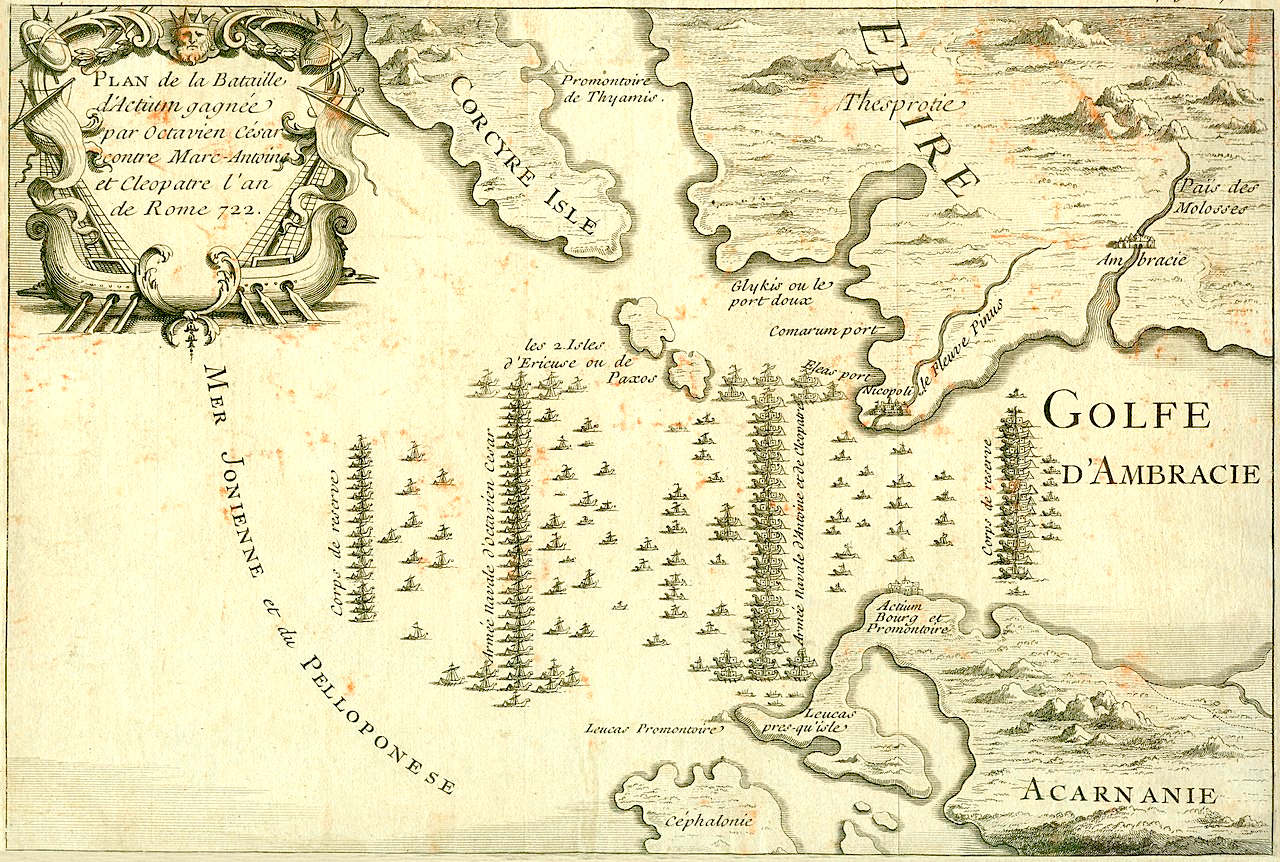
COMBAT
It is estimated that Antony had around 140 ships, to Octavian's 260. Antony had shown up to Actium with a much larger force of around 500 ships, but could not man all of them. The problem facing Antony was desertion. Plutarch and Dio speak of how desertion and disease plagued Antony's camp. What Antony lacked in quantity was made up for in quality: his ships were mainly the standard Roman warship, quinqueremes with smaller quadriremes, heavier and wider than Octavian's, making them ideal weapon platforms, however, due to their larger size they were less manoeuvrable than Octavian's ships.
Antony's personal flagship, like his admirals', was a "ten". An "eight" war galley had around 200 heavy marines, archers and at least six ballista catapults. Larger than Octavian's ships, Antony's war galleys were very difficult to board in close combat and his troops were able to rain missiles onto smaller and lower ships. The harpax, Agrippa's device made for grappling and boarding enemy ships, made this task a bit easier. The galleys' bows were armoured with bronze plates and square-cut timbers, making a successful ramming attack with similar equipment difficult. The only way to disable such a ship was to smash its oars, rendering it immobile and isolated from the rest of its fleet. Antony's ships' main weakness was lack of manoeuvrability; such a ship, once isolated from its fleet, could be swamped with boarding attacks. Also, many of his ships were undermanned with rowing crews; there had been a severe malaria outbreak while they were waiting for Octavian's fleet to arrive.
Octavian's fleet was largely made up of smaller "Liburnian" vessels. His ships, though smaller, were still manageable in the heavy surf and could outmanoeuvre Antony's ships, get in close, attack the above-deck crew with arrows and ballista-launched stones, and retreat. Moreover, his crews were better-trained, professional, well-fed and rested. A medium ballista could penetrate the sides of most warships at close range and had an effective range of around 200 yards. Most ballistas were aimed at the marines on the ships' fighting decks.
Before the battle one of Antony's generals, Quintus Dellius, defected to Octavian, bringing with him Antony's battle plans.
Shortly after midday, Antony was forced to extend his line from the protection of the shore and finally engage the enemy. Seeing this, Octavian's fleet put to sea. Antony had hoped to use his biggest ships to drive back Agrippa's wing on the north end of his line, but Octavian's entire fleet, aware of this strategy, stayed out of range. By about noon the fleets were in formation but Octavian refused to be drawn out, so Antony was forced to attack. The battle raged all afternoon without decisive result.
Cleopatra's fleet, in the rear, retreated to the open sea without engaging. A breeze sprang up in the right direction and the Egyptian ships were soon out of
sight. Lange argues that Antony would have had victory within reach were it not for Cleopatra's retreat.
Antony had not observed the signal, and believing that it was mere panic and all was lost, followed the fleeing squadron. The contagion spread fast; everywhere sails unfurled and towers and other heavy fighting gear went by the board. Some fought on, and only long after nightfall, when many a ship was blazing from the firebrands thrown upon them, was the work done. Making the best of the situation, Antony burned the ships he could no longer man while clustering the remainder tightly together. With many oarsmen dead or unfit to serve, the powerful, head-on ramming tactic for which the Octaries had been designed was now impossible. Antony transferred to a smaller vessel with his flag and managed to escape, taking a few ships with him as an escort to help break through Octavian's lines. Those left behind were captured or sunk.
J. M. Carter gives a differing account of the battle. He postulates that Antony knew he was surrounded and had nowhere to run. To turn this to his advantage, he gathered his ships around him in a quasi-horseshoe formation, staying close to the shore for safety. Then, should Octavian's ships approach his, the sea would push them into the shore. Antony foresaw that he would not be able to defeat Octavian's forces, so he and Cleopatra stayed in the rear of the formation. Eventually Antony sent the ships on the northern part of the formation to attack. He had them move out to the north, spreading out Octavian's ships, which until this point were tightly arranged. He sent Sosius to spread the remaining ships to the south. This left a hole in the middle of Octavian's formation. Antony seized the opportunity and, with
Cleopatra on her ship and him on a different ship, sped through the gap and escaped, abandoning his entire force.
With the end of the battle, Octavian exerted himself to save the crews of the burning vessels and spent the whole night on board. The next day, as much of the land army had not escaped to their own lands, submitted, or were followed in their retreat to
Macedonia and forced to surrender, Antony's camp was occupied, bringing an end to the war.
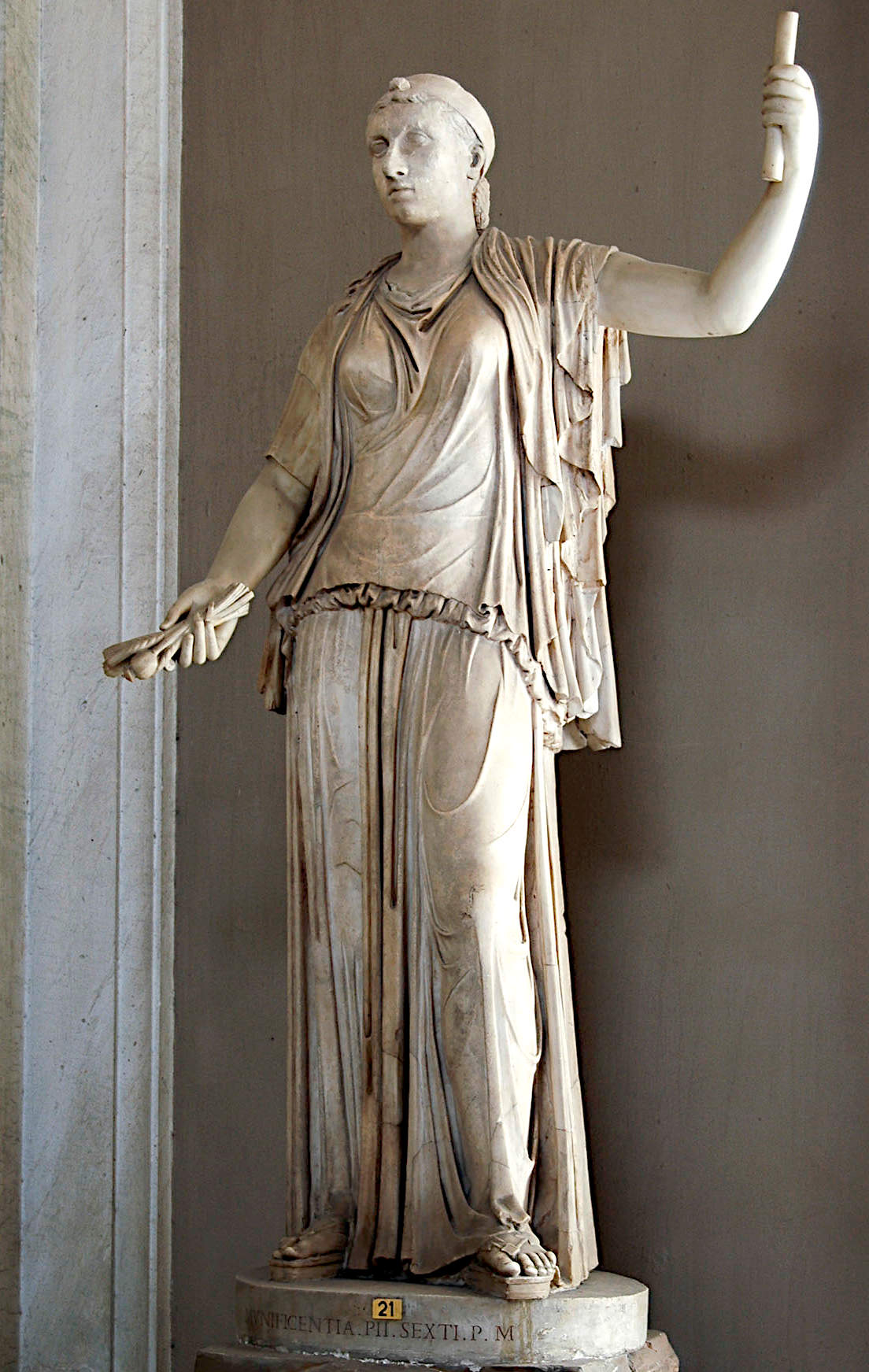
AFTERMATH
The battle had extensive political consequences. Under cover of darkness some 19 legions and 12,000 cavalry fled before Antony was able to engage Octavian in a land battle. Thus, after Antony lost his fleet, his army, which had been equal to Octavian's, deserted. Though he had not laid down his imperium, Antony was a fugitive and a rebel without that shadow of a legal position the presence of the consuls and senators had given him in the previous year. Some of the victorious fleet went in pursuit of him, but Octavian visited
Greece and Asia and spent the winter at Samos, though he had to briefly visit Brundisium to settle a mutiny and arrange for assignations of land.
At Samos Octavian received a message from Cleopatra with the present of a gold crown and throne, offering to abdicate in favor of her sons. She was allowed to believe that she would be well treated, for Octavian was anxious to secure her for his triumph. Antony, who had found himself generally deserted, after vainly attempting to secure the army stationed near Paraetonium under Pinarius and sending his eldest son Antyllus with money to Octavian and an offer to live at Athens as a private citizen, found himself in the spring attacked on two sides. Cornelius Gallus was advancing from Paraetonium and Octavian landed at Pelusium, with the connivance, it was believed, of Cleopatra. Antony was defeated by Gallus and, returning to Egypt, advanced on Pelusium.
Despite a minor victory at Alexandria on 31 July 30 BC, more of Antony's men deserted, leaving him with insufficient forces to fight Octavian. A slight success over Octavian's tired soldiers encouraged him to make a general attack, in which he was decisively beaten. Failing to escape by ship, he stabbed himself in the stomach upon mistakenly believing false rumours propagated by Cleopatra claiming that she had committed suicide. He did not die at once, and when he found out that Cleopatra was still alive, he insisted on being taken to the mausoleum where she was hiding, and died in her arms. She was soon brought to the palace and vainly attempted to move Octavian to pity.
Cleopatra killed herself on 12 August 30 BC. Most accounts say she put an end to her life by the bite of an asp conveyed to her in a basket of figs. Octavian had Caesarion killed later that month, finally securing his legacy as Caesar's only 'son', while sparing Cleopatra's children by Antony, with the exception of Antony's older son. Octavian admired the bravery of Cleopatra, and gave her and Antony a public military funeral in Rome. The funeral was grand and a few of Antony's legions marched alongside the tomb. A day of mourning throughout Rome was enacted. This was partly due to Octavian's respect to Antony and partly because it further helped show the Roman people how benevolent Octavian was. Octavian had previously shown little mercy to surrendered enemies and acted in ways that had proven unpopular with the Roman people, yet he was given credit for pardoning many of his opponents after the Battle of Actium. Further, after the battle, upon Octavian's return to
Rome he celebrated his triple triumph spread over three days: the first for his victory over Illyria, the second for the Battle of Actium, and the third for his conquest of
Egypt.
Octavian's victory at Actium gave him sole, uncontested control of "Mare
Nostrum" ("Our Sea", i.e., the Roman
Mediterranean) and he became "Augustus Caesar" and the "first citizen" of
Rome. The victory, consolidating his power over every Roman institution, marked Rome's transition from republic to empire.
Egypt's surrender after Cleopatra's death marked the demise of both the Hellenistic Period and the Ptolemaic Kingdom, turning it into a Roman province.
To commemorate his victory, Octavian founded the nearby city of Nicopolis (the City of Victory) 29 BC on the southernmost promontory of Epirus, and opposite Actium at the mouth of the Ambracian Gulf.
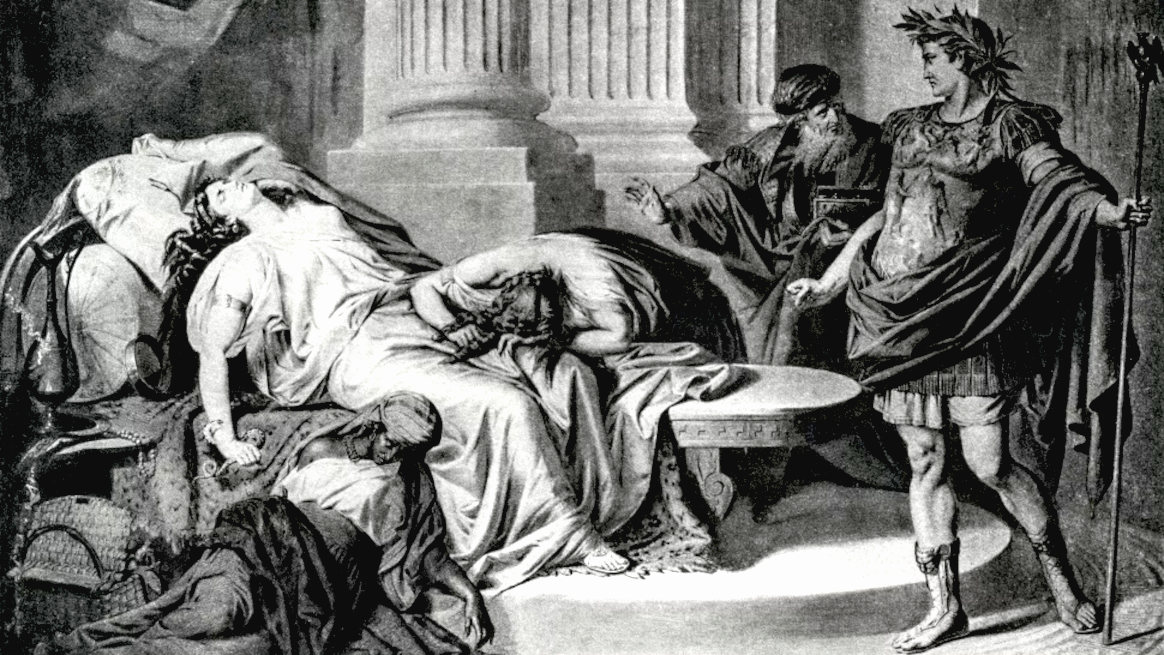
Cleopatra
takes her own life with a poison asp, Octavian unable to prevent.
ANTONY & CLEOPATRA
In early 31 BC, Antony and Cleopatra were temporarily stationed in Greece when Octavian gained a preliminary victory: the navy successfully ferried troops across the Adriatic Sea under the command of Agrippa. Agrippa cut off Antony and Cleopatra's main force from their supply routes at sea, while Octavian landed on the mainland opposite the island of Corcyra (modern Corfu) and marched south. Trapped on land and sea, deserters of Antony's army fled to Octavian's side daily while Octavian's forces were comfortable enough to make preparations.
Antony's fleet sailed through the bay of Actium on the western coast of Greece in a desperate attempt to break free of the naval blockade. It was there that Antony's fleet faced the much larger fleet of smaller, more maneuverable ships under commanders Agrippa and Gaius Sosius in the Battle of Actium on 2 September 31 BC. Antony and his remaining forces were spared only due to a last-ditch effort by Cleopatra's fleet that had been waiting nearby.
Octavian pursued them and defeated their forces in Alexandria on 1 August 30
BC - after which Antony and Cleopatra committed suicide. Antony fell on his own sword and was taken by his soldiers back to Alexandria where he died in Cleopatra's arms. Cleopatra died soon after, reputedly by the venomous bite of an asp or by poison.
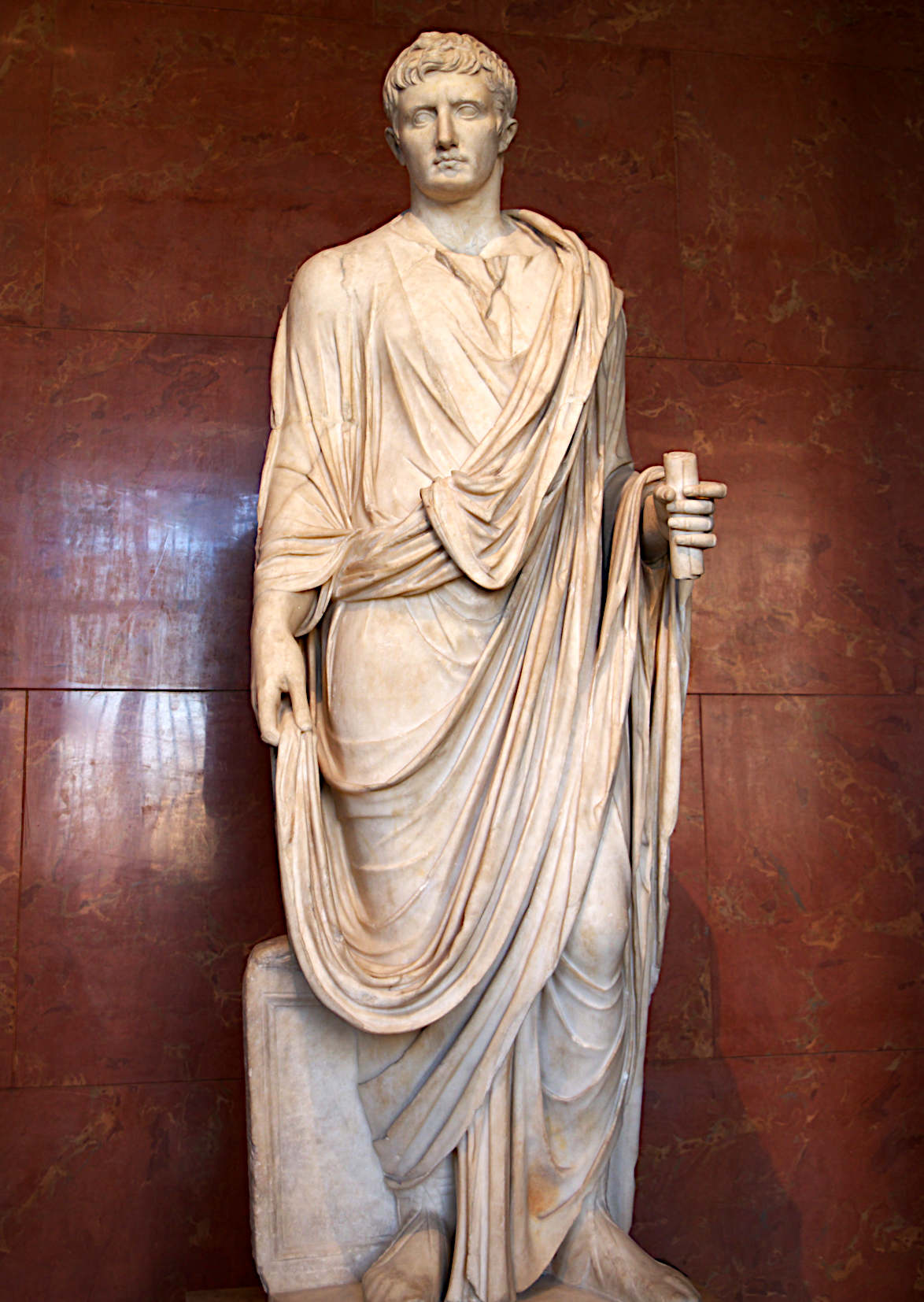
COULD
THE BATTLE HAVE BEEN WON BY MARK ANTONY & CLEOPATRA?
That is a very interesting question. There is no definitive answer to how Mark Antony and Cleopatra could have defeated Octavian at the Battle of
Actium, but some historians have speculated on different scenarios and possibilities. Here are some of them:
1 - One possibility is that Antony and Cleopatra could have avoided the battle altogether, and instead focused on consolidating their power in the East, where they had many allies and resources. They could have tried to negotiate a peace treaty with
Octavian, or at least delay the confrontation until they had a more favorable position.
2 - Another possibility is that Antony and Cleopatra could have changed their strategy during the battle, and not relied so much on their large and heavy ships, which were vulnerable to Octavianís smaller and faster vessels. They could have used their superior numbers of infantry and archers to attack Octavianís fleet from the shore, or to board and capture his ships. They could have also taken advantage of the wind and tide conditions, which favored them at the beginning of the battle, and not allowed Octavian to maneuver his fleet into a better position.
3 - A third possibility is that Antony and Cleopatra could have acted differently after the battle, and not fled to Egypt so hastily. They could have rallied their remaining forces, which still outnumbered
Octavianís, and tried to fight another day. They could have also sought refuge in other parts of the Mediterranean, where they had loyal supporters, such as in North Africa or Asia Minor. They could have hoped for a change of fortune, or for a rebellion or civil war in Rome, which would have weakened Octavianís authority.
Of course, these are all hypothetical scenarios, and we cannot know for sure what would have happened if Antony and Cleopatra had done things differently. The Battle of Actium was a decisive moment in history, and it marked the end of the Roman Republic and the beginning of the Roman Empire under
Octavian, who became known as Augustus.
If
the prophesy of reincarnation, otherwise known as the Curse
of Cleopatra, were to come true using modern technology to replicate the
pharaoh queen, we wonder how she would view the situation today, complicated
many times over with eight billion inhabitants on the planet, and with
nuclear weapons, that could annihilate all life on earth, many times over.
|






